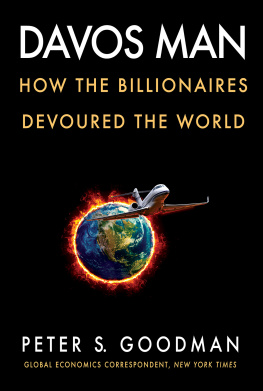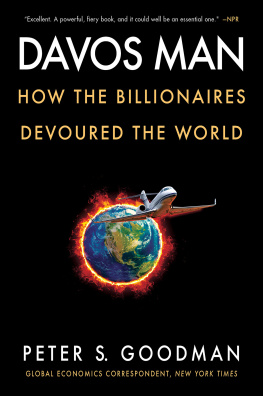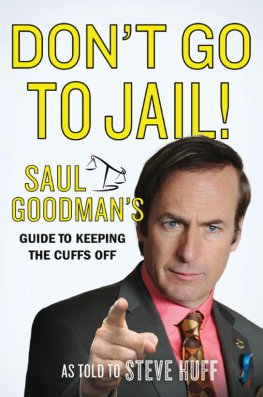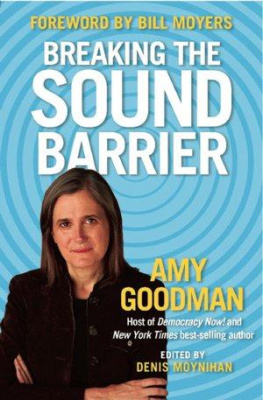Peter S. Goodman - Davos Man
Here you can read online Peter S. Goodman - Davos Man full text of the book (entire story) in english for free. Download pdf and epub, get meaning, cover and reviews about this ebook. year: 2022, publisher: HarperCollins, genre: Politics. Description of the work, (preface) as well as reviews are available. Best literature library LitArk.com created for fans of good reading and offers a wide selection of genres:
Romance novel
Science fiction
Adventure
Detective
Science
History
Home and family
Prose
Art
Politics
Computer
Non-fiction
Religion
Business
Children
Humor
Choose a favorite category and find really read worthwhile books. Enjoy immersion in the world of imagination, feel the emotions of the characters or learn something new for yourself, make an fascinating discovery.
- Book:Davos Man
- Author:
- Publisher:HarperCollins
- Genre:
- Year:2022
- Rating:3 / 5
- Favourites:Add to favourites
- Your mark:
- 60
- 1
- 2
- 3
- 4
- 5
Davos Man: summary, description and annotation
We offer to read an annotation, description, summary or preface (depends on what the author of the book "Davos Man" wrote himself). If you haven't found the necessary information about the book — write in the comments, we will try to find it.
Davos Man — read online for free the complete book (whole text) full work
Below is the text of the book, divided by pages. System saving the place of the last page read, allows you to conveniently read the book "Davos Man" online for free, without having to search again every time where you left off. Put a bookmark, and you can go to the page where you finished reading at any time.
Font size:
Interval:
Bookmark:
For Leah, Leo, Mila, and Luca
They Write the Rules for the Rest of the World
For most of us, 2020 was a year of prolonged torment. Its very numerals seem likely to endure as shorthand for mass death, fear, isolation, shuttered schools, threats to livelihood, and countless more mundane forms of misery from the worst pandemic in a century.
But one select groupa species of human known as Davos Manthrived like never before. The wealthiest, most powerful people on earth used their money and influence to separate themselves from the pandemic, riding it out in their oceanfront estates, mountain hideaways, and yachts. They feasted on calamity, snapping up real estate, shares of stock, and other companies at distressed prices. They applied their lobbying muscle to turn gargantuan, taxpayer-financed bailout packages into corporate welfare schemes for the billionaire class.
They seized on the pandemica disaster worsened by their plundering of public health care systems and stripping of government resourcesas an opportunity to take credit for rescuing humanity. In a year that exposed the fatal consequences of decades of tax evasion by the worlds billionaires, the same people who engineered this monumental grift demanded adulation for their generosity.
In the pandemic, it was CEOs in many, many cases all over the world who were the heroes, said Marc Benioff, founder of Salesforce, a Silicon Valley software giant. Theyre the ones who stepped forward with their financial resources and their corporate resources, their employees, their factories, and pivoted rapidlynot for profit, but to save the world.
Benioff was speaking in late January 2021 at the annual meeting of the World Economic Forum, the ultimate gathering place for the most affluent people on the planet. The pandemic had forced the cancellation of the usual in-person event in the Swiss Alps resort of Davos. In place of the white geodesic dome where Benioff held a lunch that included pop stars like Bono and Will.i.am, he and his fellow panelists convened on a clunky videoconferencing platform. The snow-covered peaks that formed the backdrop to Davos were replaced by drapes and bookcases glimpsed behind the speakers in their home offices. Instead of the free-flowing conversation of the Forum, participants engaged in halting discussion marred by connectivity issues.
But one key attribute endured despite the awkward refashioning of Davos: the lofty pledges for change voiced by the people most invested in preserving the status quo.
Benioff was on a panel discussing so-called stakeholder capitalism, the idea that businesses were no longer ruled solely by the imperative to enrich shareholders, but answerable to a broader array of interestsemployees, the environment, local communities. His message was self-congratulatory: mission accomplished.
He and his fellow CEOs had banded together to secure protective gear like face masks and gowns for hospitals. Pharmaceutical companies had developed COVID-19 vaccines in record time. Bankers had unleashed credit, preventing bankruptcies.
CEOs stepped up this year, Benioff said. We would not be where we are in the world today without the outstanding leadership of many, many CEOs who did heroic work all over the world, to basically save their communities.
Given the wretched state of the world at that moment, Benioffs depiction was breathtaking, a striking form of self-aggrandizement served up as social concern. It highlighted the gap between the billionaire class and the rest of humankind, one that stretched beyond the decimal places required to convey their fortunes. Benioff and his fellow corporate chieftains were effectively inhabitants of a separate realitythe realm of Davos Man.
Around the world, the pandemic had killed more than 2 million people while threatening hundreds of millions with poverty and hunger. The actual culprit was the coronavirus, but its lethal impacts and economic ravages had been magnified by the actions of the sorts of CEOs who flocked to Davos.
Private equity magnates like Stephen Schwarzman, who once described a proposed tax increase on the wealthy as an act of warlike when Hitler invaded Polandhad extracted profits from his investments in hospitals, excising costs while contributing to a systemic diminishing of American health care. Jamie Dimon, overseer of the biggest bank in the United States, had helped secure tax cuts for people who lived in Park Avenue penthouses, paid for by a weakening of government services. Larry Fink, the worlds largest asset manager, broadcast his putative concern for social justice while squeezing poor countries to pay impossible debts in the midst of the pandemic.
The richest man on earth, Jeff Bezos, had added to the colossal scale of his e-commerce empire while failing to provide warehouse workers with protective gear, instead bestowing a valiant sounding title: they were essential workersa label that condemned them as dispensable, rendering the virus an illegitimate reason to stay home.
If the agony of 2020 had demonstrated anything it was how the rich could not only prosper but profiteer off everyone elses suffering.
By the end of the year, the collective wealth of billionaires worldwide had increased by $3.9 trillion, even as their philanthropic contributions fell to their lowest level in nearly a decade. Over the same year, as many as 500 million people descended into poverty, with their recovery likely to take a decade or more.
The pharmaceutical companies had indeed displayed mastery in concocting COVID-19 vaccines. But they had priced most of humanity out of the market for their lifesaving medicines.
Inside his oceanfront estate in Hawaii, Benioff preferred to exult in his triumphs while using the pandemic as an opportunity to impugn government. Davos Man championed stakeholder capitalism as a means of preempting government regulation; as a substitute for the public making use of democracy to fairly distribute the gains of capitalism. In taking a bow on behalf of corporate executives, Benioff was implicitly advancing the idea that the government need not tax billionaires, because they could be entrusted to fix lifes problems out of their own beneficence.
CEOs are gathering every week to figure out how we can improve the state of the world and get through this pandemic, he said, contrasting that against what he described as the dysfunction of governments and nonprofit organizations. They were not the ones who saved us, Benioff said. So the public is counting on CEOs.
Benioff was revealing himself as a choice specimen of a species that we must understand if we are to make sense of what has happened to humanity over the last half century. Widening economic inequality, intensifying public anger, and threats to democratic governance have all resulted from the depredation of Davos Manan unusual predator whose power comes in part from his keen ability to adopt the guise of an ally.
Over recent decades, the billionaire class has ransacked governments by shirking taxes, leaving societies deprived of the resources needed to combat trouble. In the midst of a public health emergency, Davos Man was pointing to the resulting weakness of government as justification for depending on his generosity.
We have to say it, Benioff said. CEOs are definitely the heroes of 2020.
The term Davos Man was coined in 2004 by the political scientist Samuel Huntington. He used it to describe those so enriched by globalization and so native to its workings that they were effectively stateless, their interests and wealth flowing across borders, their estates and yachts sprinkled across continents, their arsenal of lobbyists and accountants straddling jurisdictions, eliminating loyalty to any particular nation.
Font size:
Interval:
Bookmark:
Similar books «Davos Man»
Look at similar books to Davos Man. We have selected literature similar in name and meaning in the hope of providing readers with more options to find new, interesting, not yet read works.
Discussion, reviews of the book Davos Man and just readers' own opinions. Leave your comments, write what you think about the work, its meaning or the main characters. Specify what exactly you liked and what you didn't like, and why you think so.













